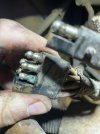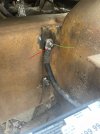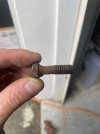Nick Tonelli
Member
I have a 1986 Case 580SE and have bee having some intermittent difficulty starting occasionally the machine would go dead and starter would click like a low/dead battery. Sometimes tach would bounce all over the place but now machine is no completely dead in water, I was able hook jumpers to starter and it started right up multiple times but now that does nothing for me. When jumping the starter solenoid it would only click.
Some additional info:
- Brand new battery
- 10.4 volts to starter (is this normal?)
- neutral safety switch has continuity
- grounds checked, cleaned and re-tightened
I followed this thread as the guy had the same exact symptoms as me. My cab harness has similar symptoms to him while all connections looked great the red wire had some corrosion at connection. I bypassed harness with heat shrink, butt connectors and 10 gauge wire but no change.

 www.heavyequipmentforums.com
www.heavyequipmentforums.com
Based on the thread I linked above I have the 3 relay wiring harness as I have no inline fuse behind starter and no big relay that I could find. I tested the three relays across the 85/86 contacts and they have continuity. I also checked the 5 circuit breakers and all have continuity
While inspecting the cab harness connection there was no visible wear from rubbing the top of the bellhousing that might cause a short.
My machine has some rust but the electrical connections are all in really good shape, I quadruple checked the grounds (that I could find) especially the battery ground and its clean and secure.
With test light I have power to accessories contacts on ignition switch but test light shows no power to ignition contacts on the switch. I use to be able to jump the starter solenoid but today it won't do anything. I swapped out with a new starter and nothing has changed
I might be providing a lot of confusing (even conflicting) information but I've tried in earnest to diagnose and remedy myself and search this forum for similar results but have come up empty handed and confused. I'm very 12v naive.
Some additional info:
- Brand new battery
- 10.4 volts to starter (is this normal?)
- neutral safety switch has continuity
- grounds checked, cleaned and re-tightened
I followed this thread as the guy had the same exact symptoms as me. My cab harness has similar symptoms to him while all connections looked great the red wire had some corrosion at connection. I bypassed harness with heat shrink, butt connectors and 10 gauge wire but no change.

580e problem! no power to ignition
i have my 580e, replaces the ground strap and cables not long ago, batteries were weak so i was jumping the one side, it cranked for about a second, didnt kick over and then letting off the key i heard a sizzle under the dash, now i have no power to gauges, or ignition switch, pulled the switch...
 www.heavyequipmentforums.com
www.heavyequipmentforums.com
Based on the thread I linked above I have the 3 relay wiring harness as I have no inline fuse behind starter and no big relay that I could find. I tested the three relays across the 85/86 contacts and they have continuity. I also checked the 5 circuit breakers and all have continuity
While inspecting the cab harness connection there was no visible wear from rubbing the top of the bellhousing that might cause a short.
My machine has some rust but the electrical connections are all in really good shape, I quadruple checked the grounds (that I could find) especially the battery ground and its clean and secure.
With test light I have power to accessories contacts on ignition switch but test light shows no power to ignition contacts on the switch. I use to be able to jump the starter solenoid but today it won't do anything. I swapped out with a new starter and nothing has changed
I might be providing a lot of confusing (even conflicting) information but I've tried in earnest to diagnose and remedy myself and search this forum for similar results but have come up empty handed and confused. I'm very 12v naive.
Attachments
Last edited:





